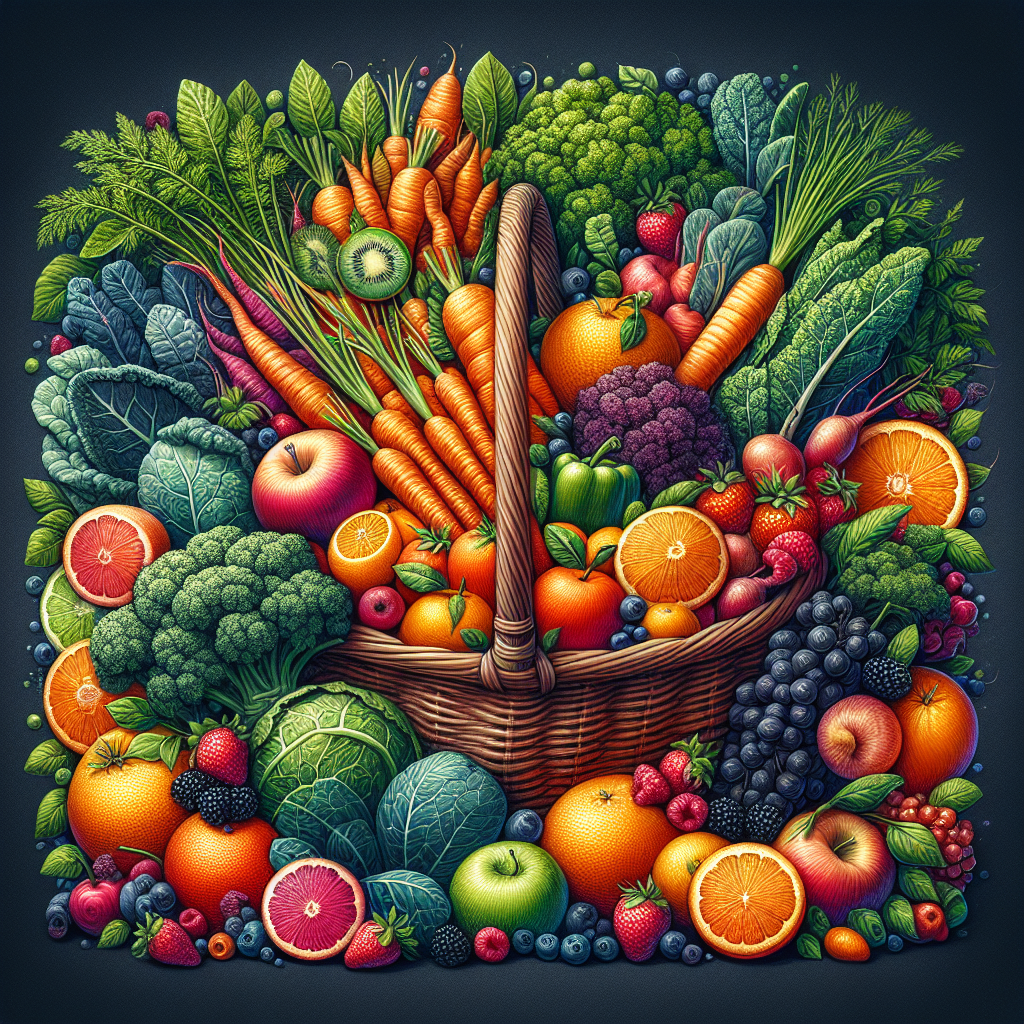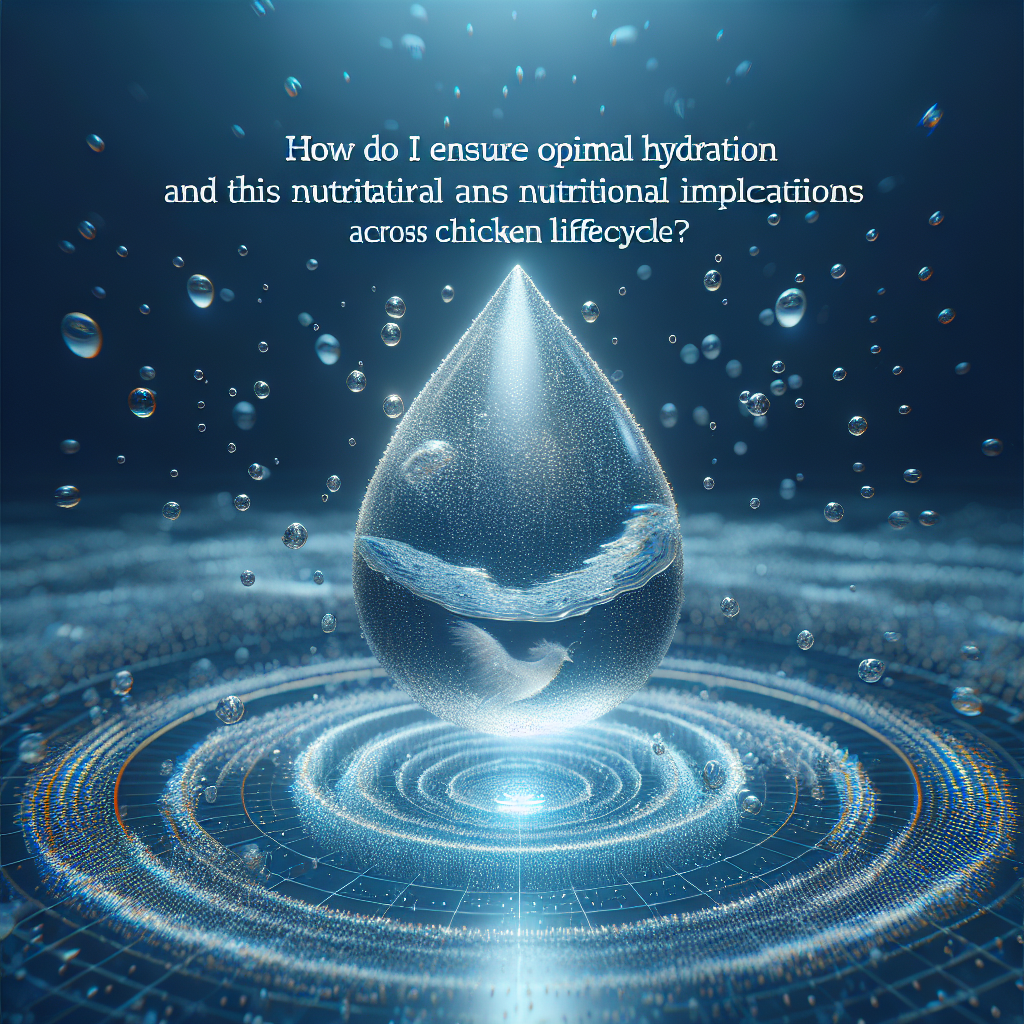In this article, we will explore the issue of potential vitamin deficiencies in free-ranging chickens and how you can effectively address them. As chickens roam freely and forage in their natural environment, they have the opportunity to consume a diverse range of foods. However, this can also lead to variations in their diet and potential nutrient gaps. By understanding the common vitamin deficiencies that chickens may encounter and implementing the right strategies, you can ensure your free-ranging chickens maintain optimal health and productivity. Let’s dive in and discover how you can provide the best care for your feathered friends.
Understanding Vitamin Deficiencies in Free-Ranging Chickens
When it comes to keeping free-ranging chickens healthy, understanding and addressing vitamin deficiencies is crucial. Vitamins play a vital role in the overall well-being and optimal growth of these birds. Vitamin deficiencies can occur due to various factors, including insufficient dietary intake, poor absorption, or inadequate exposure to sunlight. In this article, we will explore the causes, symptoms, and methods of addressing vitamin deficiencies in free-ranging chickens.
What are Vitamin Deficiencies?
Vitamin deficiencies occur when a chicken’s diet lacks specific vitamins necessary for their physiological functions. Vitamins are essential for various bodily processes, such as maintaining healthy feathers, bone development, immune system support, and proper metabolism. While chickens can produce some vitamins internally, they rely heavily on their diet to meet their nutritional needs. Therefore, it is crucial to understand the causes and symptoms of vitamin deficiencies to ensure the well-being of free-ranging chickens.
Causes of Vitamin Deficiencies in Free-Ranging Chickens
Free-ranging chickens have the opportunity to find their own food, but this doesn’t always guarantee a well-rounded diet. Some common causes of vitamin deficiencies in these birds include limited access to a diverse foraging environment, inadequate intake of vitamin-rich foods, insufficient sunlight exposure, and inadequate absorption due to gastrointestinal issues. It is essential for chicken owners to be aware of these potential causes and take the necessary steps to address them.
Common Symptoms of Vitamin Deficiencies
Identifying vitamin deficiencies can be challenging, as the symptoms may vary depending on the specific vitamin lacking in a chicken’s diet. However, there are some common signs to look out for. These include slow growth, poor feather condition, reduced egg production, weak immune system leading to frequent infections, weight loss, bone deformities, and reproductive issues. If you observe any of these symptoms in your chickens, it’s important to investigate further and address any potential vitamin deficiencies promptly.
The Importance of Addressing Vitamin Deficiencies
Addressing vitamin deficiencies is crucial for maintaining the overall health and well-being of free-ranging chickens. Vitamin deficiencies can have detrimental effects on their growth, reproductive capabilities, and immune system function. By ensuring that chickens have a balanced diet and receive adequate vitamin intake, owners can help prevent various health issues and promote optimal productivity. It is important to be proactive in addressing vitamin deficiencies in order to provide the best care for these birds.
Identifying Vitamin Deficiencies
To identify and address vitamin deficiencies accurately, it is recommended to consult a veterinarian, conduct blood tests, observe physical signs, and maintain proper records. These methods will help you understand the specific vitamins your chickens may be lacking, allowing for targeted supplementation or dietary adjustments to rectify the deficiencies.
Consulting a Veterinarian
A veterinarian with expertise in poultry health can be a valuable resource when it comes to identifying and addressing vitamin deficiencies. They will perform a thorough examination of your chickens and may recommend specific blood tests to assess vitamin levels accurately. Consulting a veterinarian is especially beneficial if you are unsure of the underlying cause of any health issues your chickens may be experiencing.
Conducting Blood Tests
Blood tests can provide valuable insights into a chicken’s vitamin levels and overall health. A veterinarian can perform these tests to measure the concentrations of various vitamins in your chickens’ blood. This information will help determine if there are any deficiencies that need to be addressed and guide the appropriate course of action.
Observing Physical Signs
Physical signs can often indicate potential vitamin deficiencies in chickens. These signs may include poor feather quality, pale combs and wattles, weak and thin eggshells, leg deformities, and slow growth. By observing these physical signs, you can narrow down the potential vitamin deficiencies and take the necessary steps to address them.
Maintaining Proper Records
Keeping proper records of your chickens’ health, diet, and vitamin supplementation is essential for identifying and addressing vitamin deficiencies. Record-keeping allows you to track any changes in their health, evaluate the effectiveness of supplementation methods, and make informed adjustments to their diet or management practices. By maintaining a comprehensive record, you can better understand your chickens’ needs and minimize the risk of vitamin deficiencies.
Vitamin A Deficiency
Vitamin A deficiency is a common issue among free-ranging chickens and can have significant health implications if left unaddressed. This essential vitamin plays a crucial role in maintaining healthy vision, promoting good feather quality, supporting reproductive health, and boosting immune system function.
Symptoms of Vitamin A Deficiency
Chickens deficient in vitamin A may exhibit symptoms such as poor feather quality, respiratory issues, decreased egg production, night blindness, and reduced immune response. These symptoms can significantly impact their overall well-being and productivity.
Sources of Vitamin A
To address vitamin A deficiency, it is essential to provide chickens with sufficient dietary sources of this vitamin. Rich sources of vitamin A include dark, leafy greens such as kale, spinach, and dandelion greens, as well as orange and yellow fruits and vegetables such as carrots and squash.
Supplementation Methods
In cases where dietary sources are not sufficient, vitamin A supplements can be included in the chickens’ feed. These supplements should be administered according to the manufacturer’s recommendations and in consultation with a veterinarian.
Preventive Measures
Preventing vitamin A deficiency in free-ranging chickens involves ensuring a well-balanced diet that includes ample sources of this vital vitamin. Additionally, maintaining an appropriate foraging environment where chickens have access to a variety of vitamin A-rich foods can help prevent deficiencies from occurring in the first place.
Vitamin D Deficiency
Vitamin D plays a crucial role in the absorption of calcium and phosphorus, which are essential for strong bones and eggshell formation. Without adequate vitamin D, chickens are at risk of developing weak bones, rickets, and poor eggshell quality.
Symptoms of Vitamin D Deficiency
Chickens deficient in vitamin D may display symptoms such as lameness, swollen or deformed legs, decreased egg production, and soft or thin eggshells. These symptoms can significantly impact their mobility, reproductive capabilities, and overall health.
Sources of Vitamin D
One of the primary sources of vitamin D for chickens is exposure to sunlight. When chickens are allowed to free-range, they have the opportunity to soak up the sun’s rays, which triggers vitamin D synthesis in their skin. Additionally, certain foods such as fish oils and fortified feeds can also provide vitamin D.
Supplementation Methods
In cases where chickens have limited sunlight exposure or dietary sources are inadequate, vitamin D supplementation may be necessary. This can be achieved through the inclusion of vitamin D supplements in their feed or the use of specialized vitamin D supplements recommended by a veterinarian.
UV Exposure as a Solution
To ensure optimal vitamin D levels, it is crucial to provide free-ranging chickens with access to sunlight. Allowing them ample time to roam outdoors, especially during sunny periods, will facilitate natural vitamin D synthesis and reduce the risk of deficiencies.
Vitamin E Deficiency
Vitamin E is an antioxidant that plays a vital role in protecting cells from damage and supporting optimal immune system function. When free-ranging chickens lack adequate vitamin E, their health and productivity may be compromised.
Symptoms of Vitamin E Deficiency
Symptoms of vitamin E deficiency in chickens may include muscle weakness, reduced fertility, decreased hatchability, poor immune response leading to increased susceptibility to infections, and muscle degeneration. These symptoms can profoundly impact their overall well-being and performance.
Sources of Vitamin E
Chickens can obtain vitamin E from various sources, including green leafy vegetables, seeds, nuts, and vegetable oils. Incorporating these foods into their diet can help maintain adequate vitamin E levels.
Supplementation Methods
In situations where dietary sources are insufficient, vitamin E supplements can be included in the chickens’ feed. These supplements should be administered according to the manufacturer’s recommendations and in consultation with a veterinarian.
Ensuring a Balanced Diet
Ensuring that free-ranging chickens have a well-balanced diet is crucial for preventing vitamin E deficiencies. A diverse range of foraging options, including access to green leafy vegetables and other vitamin E-rich foods, will help fulfill their nutritional needs and minimize the risk of deficiencies.
Vitamin K Deficiency
Vitamin K is essential for blood clotting and plays a crucial role in maintaining healthy bone density. Free-ranging chickens that lack adequate vitamin K may be prone to bleeding disorders and bone abnormalities.
Symptoms of Vitamin K Deficiency
Symptoms of vitamin K deficiency may include prolonged bleeding, easy bruising, weak bones, and poor eggshell quality. These symptoms can significantly impact a chicken’s overall health and productivity.
Sources of Vitamin K
Vitamin K can be obtained through various dietary sources, including green leafy vegetables, alfalfa, and other types of forage. These foods should be included in the chickens’ diet to ensure adequate vitamin K intake.
Supplementation Methods
If dietary sources of vitamin K are insufficient, supplementation may be necessary. Incorporating vitamin K supplements into the chickens’ feed can help address deficiencies. It is recommended to consult with a veterinarian to determine the appropriate dosage and administration method.
Using Alfalfa or Leafy Greens
To ensure an adequate supply of vitamin K, it is advisable to include foods such as alfalfa or leafy greens in the chickens’ diet. These sources provide natural, bioavailable forms of vitamin K and can contribute to maintaining optimal health.
Vitamin B12 Deficiency
Vitamin B12 is essential for proper neurological function and the formation of red blood cells. Without adequate vitamin B12, free-ranging chickens can experience health issues and reduced productivity.
Symptoms of Vitamin B12 Deficiency
Chickens deficient in vitamin B12 may exhibit symptoms such as poor feather quality, reduced appetite, lethargy, weight loss, anemia, and neurological abnormalities. These symptoms can significantly impact their overall well-being and performance.
Sources of Vitamin B12
Vitamin B12 is primarily found in animal-based sources such as meat, fish, and dairy products. Including these foods in the chickens’ diet can help maintain adequate vitamin B12 levels.
Supplementation Methods
If animal-based sources are limited or unavailable, vitamin B12 supplements can be administered to address deficiencies. These supplements should be used in consultation with a veterinarian and according to the manufacturer’s recommendations.
Including Animal Protein or Supplements
To prevent vitamin B12 deficiency, it is essential to provide free-ranging chickens with appropriate sources of animal proteins. Incorporating meat and fish scraps, dairy products, or vitamin B12 supplements in their diet can help meet their vitamin B12 requirements.
Vitamin C Deficiency
Vitamin C is a powerful antioxidant that supports immune function and aids in collagen production. While chickens can produce their own vitamin C, certain factors may increase their need for this essential nutrient.
Symptoms of Vitamin C Deficiency
Symptoms of vitamin C deficiency in chickens may include slow growth, poor feather quality, increased susceptibility to infections, reduced resistance to stress, and joint abnormalities. These symptoms can significantly affect their overall health and productivity.
Sources of Vitamin C
Vitamin C can be found in various fruits and vegetables, such as oranges, bell peppers, berries, and leafy greens. Including these vitamin C-rich foods in the chickens’ diet can help maintain optimal vitamin C levels.
Supplementation Methods
In situations where dietary sources of vitamin C are insufficient, supplementation may be necessary. Vitamin C supplements can be administered in consultation with a veterinarian and according to the manufacturer’s recommendations.
Including Fruits and Vegetables
To ensure an adequate vitamin C intake, it is important to include a variety of fruits and vegetables in the chickens’ diet. These foods not only provide vitamin C but also offer additional nutritional benefits and enrich their diet.
Vitamin B Complex Deficiency
The B vitamins are essential for various physiological functions, including metabolism, energy production, and nervous system health. Free-ranging chickens may experience deficiencies in one or more B vitamins, which can negatively impact their overall well-being and productivity.
Symptoms of Vitamin B Complex Deficiency
Chickens deficient in B vitamins may display symptoms such as poor growth, reduced appetite, weak immune system, poor feather quality, nervous system abnormalities, and reduced egg production. These symptoms can significantly affect their health and performance.
Sources of Vitamin B Complex
Vitamin B complex can be found in various dietary sources, including fortified feeds, legumes, whole grains, seeds, and dark leafy greens. Ensuring access to these foods can help meet the chickens’ B vitamin requirements.
Supplementation Methods
In cases where dietary sources of B vitamins are insufficient, supplementation may be necessary. Including vitamin B complex supplements in the chickens’ diet can help address deficiencies. Consultation with a veterinarian is advised to determine the appropriate dosage and administration method.
Including Fortified Feeds or Supplements
To minimize the risk of vitamin B complex deficiency, it is advisable to provide chickens with fortified feeds that contain adequate B vitamin levels. Additionally, considering the inclusion of B vitamin supplements in the diet can help ensure optimal nutrient intake.
Minimizing Vitamin Deficiencies in Free-Ranging Chickens
To minimize the occurrence of vitamin deficiencies in free-ranging chickens, it is important to implement certain management practices and provide appropriate nutritional support.
Providing a Diverse Foraging Environment
Creating a diverse foraging environment allows chickens to have access to a wide range of natural foods, ensuring a variety of vitamins and minerals in their diet. This can be achieved by allowing chickens to range in different areas, featuring a mix of grasses, bushes, and trees. Varying the environment and rotating foraging areas will provide a continuous supply of diverse foods, reducing the likelihood of deficiencies.
Maintaining a Balanced Feed
While free-ranging chickens have the opportunity to forage, it is still important to provide a nutritionally balanced feed. A high-quality poultry feed that is specifically formulated to meet the nutritional needs of chickens should be the basis of their diet. This feed should incorporate essential vitamins and minerals to supplement any deficiencies that may occur due to limited foraging opportunities.
Offering Additional Vitamin-Rich Treats
In addition to a balanced feed, providing chickens with vitamin-rich treats can be beneficial. These treats can include fruits and vegetables that are high in vitamins, such as berries, cabbage, and sweet potatoes. Offering these treats in moderation can help provide additional vitamins and prevent deficiencies.
Ensuring Access to Clean Water
Clean and freshwater is essential for chickens to maintain overall health and well-being. Water plays a vital role in digestion, nutrient absorption, and overall cellular function. By ensuring access to clean water at all times, you can help minimize the risk of vitamin deficiencies and support optimal growth and productivity.
Regularly Monitoring Overall Health
Regularly monitoring the overall health and well-being of free-ranging chickens is crucial for early detection and prompt treatment of any potential vitamin deficiencies. This includes observing their behavior, physical appearance, and overall productivity. By keeping a close eye on their health, you can intervene at the first sign of any issues and take the necessary steps to address potential vitamin deficiencies.
In conclusion, understanding and addressing vitamin deficiencies in free-ranging chickens is essential for their well-being and optimal growth. By identifying the causes, symptoms, and methods of addressing vitamin deficiencies, chicken owners can ensure that their feathered friends receive the necessary nutrition for a healthy and productive life. Through regular monitoring, balanced feeding, and creating a diverse foraging environment, we can minimize the risk of deficiencies and promote the overall health of free-ranging chickens.




